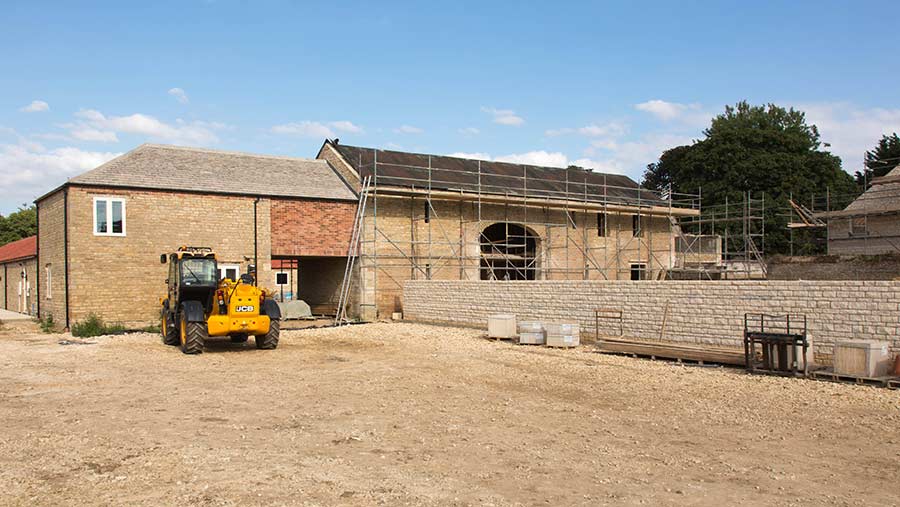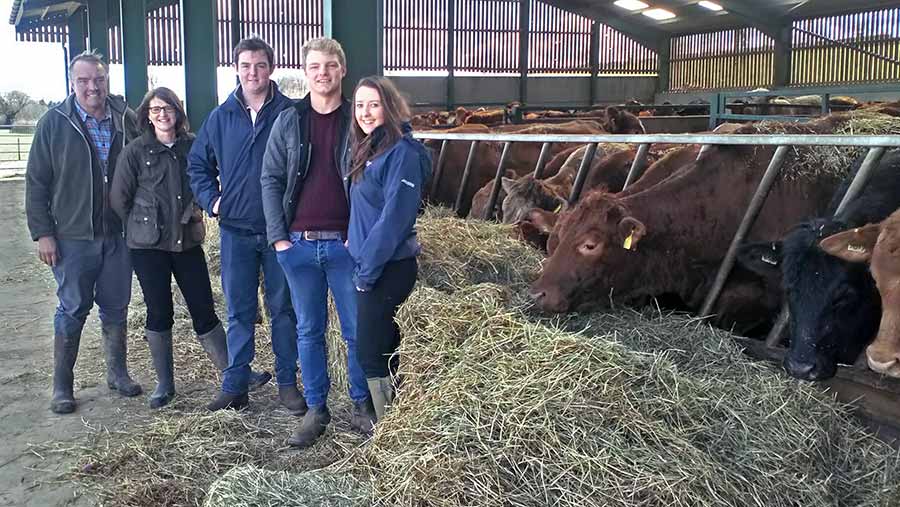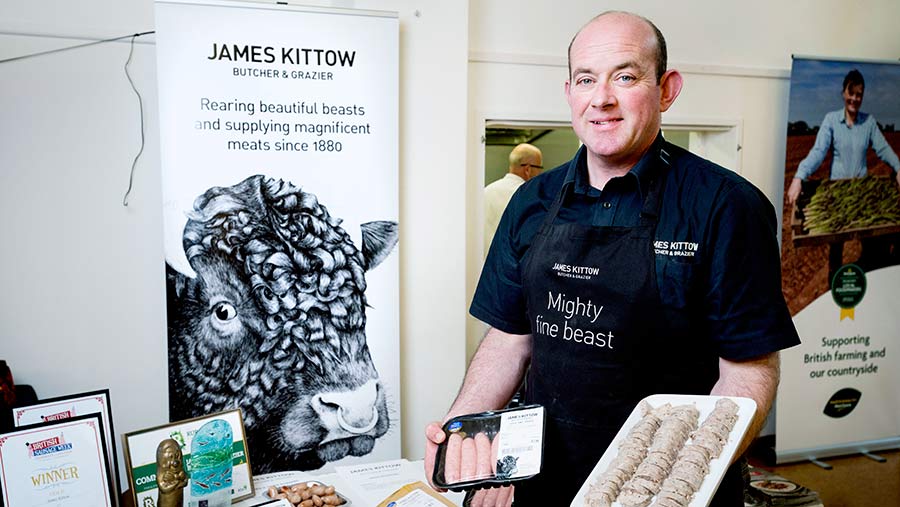Exclusive survey: 97% farms find diversification profitable
 © Tim Scrivener
© Tim Scrivener Ingenuity, drive, skill and hard work are all clear to see in the results of Farmers Weekly’s diversification survey, carried out in association with Carter Jonas.
A vast range of alternative ventures are run by the 250 people who completed the survey, with almost 100 different enterprises listed.
More than two-thirds (68%) have diversified, into areas ranging from the familiar and the popular such as commercial and residential developments, renewable energy and tourism, to a flying school, plumbing, dog training, quarrying and boatyards.
See also: Diversification advice from Farmers Weekly
Main findings
- Two-thirds of respondents are currently diversifying on their farm or estate.
- More than half of those currently diversifying plan to extend in the next five years.
- 97% of respondents who have diversified consider it a success from a profitability perspective – 51% to a great extent.
- Just one in five respondents received funding or grants for their project, with 78% not doing so.
- About one-third consider their diversification was profitable in each of the first, second and third years.
- In terms of challenges, securing planning permission, funding and budgeting for the new enterprise were the most significant.
Profitable sidelines
A huge 97% scored their alternative enterprise a success in profitability terms, with about half saying that it was profitable to a great extent and one-third seeing a profit in the first, second and third years of operation.
Eight in 10 believed it was an environmental success too.
More than half of those already diversifying plan to expand these interests in the next five years.
Areas that farmers find the most challenging are securing planning permission, funding, and correctly budgeting for a new enterprise.
Only one in five had any grant funding to help with the new venture.
Among those planning to diversify, most are looking at commercial lets such as workshops, offices and storage, alongside residential developments for tourism and the domestic rental market.
Add-on trend
There is also a notable trend to bolt extra offerings on to existing diversifications – for example, farm shops and cafes are increasingly introducing function or meeting rooms, bringing them not only the hire income for the room, but also the chance to sell to or cater for those using the facilities.
Enterprises with an educational aspect were noticeable, both in existing and planned businesses.
This is usually strongly linked to a desire to educate both children and the wider public about farming and food production, as well as providing additional income.
One farmer is planning to have an Open Farm Sunday-type event every fortnight.
Criticism and advice
While some saw diversification as essential, helping them to stay in farming, others were critical of the fact they had felt forced to go down the alternative enterprise route when they would prefer that farming provided a decent income on its own.
Others warned of the potential effect on the farming business if too much management time or cash was diverted to the new venture.
It was important to be flexible, said one farmer, who had developed a wedding barn venue in an area that was now overrun with such offerings
“There was one when we did ours, now there are eight – take care and be flexible!”
High planning fees, including one example of £90,000 to convert a barn, came in for criticism too, alongside the complex and sometimes impenetrable grants offerings.
What would people do differently if they had the chance?
Most respondents said they would not change anything, but where they would, the most common comments centred on starting at a larger scale and starting the new enterprise earlier.
Others said they would have:
- Got more financial planning and advice at start.
- Used a lawyer to draw up contracts and not relied on handshakes.
- Employed a project manager (depending on the scale of the project).
- Contracted out the farm business to allow them to concentrate on the new enterprise.
- Put more time and consideration into researching finance options.
- Been more careful in choice of biomass installer.
- Built their holiday cottages further away from the farmhouse.
Top tips from those who have been through the process
- Always cost your own time.
- Do a project to the highest standards possible – for example, for workshops, storage and holiday accommodation, better quality attracts better tenants.
- Do extensive market research to assess viability.
- Don’t deal with the public unless you like people.
- If your business involves tenants, be helpful towards them.
- Plan with expansion in mind and for the long term – many respondents wish they had thought about or planned for expansion from the start. Sites can become too crowded, restricting expansion.
- Expect projects to take longer and cost more than you anticipated.
- During construction projects, have regular weekly meetings with the builder and project manager to keep on top of things.
About the survey
- Conducted by email and online in February
- More than 250 fully completed responses
- Even spread of respondents by age, with an average age of 48:
Who completed the survey?
- Farm owner 63%
- Relative of farmer, working on farm 15%
- A mixture 7%
- Farm worker 5%
- Farm manager 4%
- Farm contractor 1%
- Involved in a farming joint venture 1%
- Other 4%
Ages
- Under 18 – 2%
- 18-24 – 9%
- 25-34 – 14%
- 35-44 – 16%
- 45-54 – 16%
- 55-64 – 26%
- 65 and above – 17%
Average farm size was 277ha. Respondents were in the South West (18%), the Midlands (17%), East Anglia (11%), the South East (11%), Yorkshire and Humberside (11%), Wales (10%) and Scotland (9%).
Sponor’s message

As a multi-disciplinary property advisory business, we help clients maximise their farm and estate profitability through diversification.
The theme of diversification is very relevant to many of the estates under our management, and the results of the survey will assist our team of experts in strategically advising clients in the current period of economic and political uncertainty.
Thanks to Carter Jonas whose sponsorship made it possible to conduct the diversification survey. Farmers Weekly had full editorial control of this feature.
Case study
The Kemps, Glebe Farm, Barton le Street, North Yorkshire
The Kemp family have been diversifying for more than 30 years, starting with a pick your own (PYO) site on its original home farm at Horsforth, near Leeds.
The PYO established well, followed by a livery that now caters for 34 horses and has a waiting list.
More recently, new ventures have been added by Rory and Diane Kemp, with Rory’s sons Will and Joe. These include direct beef, turkey and OSR oil sales, often to a ready-made and loyal customer base at the PYO.
The 5ha PYO’s main crops are ground-grown strawberries and raspberries. Pumpkins were added by Joe last autumn.
About 12,000 seeds were sown and the produce sold out several days before Halloween. This year the plan is to sow 22,000 seeds.
The family’s base is now at Glebe Farm, Barton le Street, near Malton, North Yorkshire, which was an arable farm. This was bought in 1997 mainly with the proceeds of the sale of the Horsforth farm milk quota after the family came out of dairy.
Will recently finished university and has taken on the rapidly expanding closed Stabiliser suckler herd, calving 91 head this spring and another 50 in the autumn. All heifers are currently kept for herd expansion and replacements.
While most of the finished steers born in 2017 are sold through York market, another more recent development sees several a year slaughtered and butchered locally for direct sales.
The higher-value cuts are mainly sold locally, while the forequarter meat goes into burgers and sausages sold through the PYO.

The Kemp family: Rory, Diane, Joe and Will, and Will’s girlfriend Sioned Williams
The farm also has a bull beef unit finishing all the 2018-born male progeny entire.
An arable reversion Countryside Stewardship scheme has helped fund fencing and establishment of a larger grass acreage for the beef herd, as well as helping with blackgrass control on parts of the farm.
Rapeseed oil was added in 2016 under the farm’s own Dales Gold brand, with a local farmer crushing 3t batches of seed on contract to produce approximately 1,000 litres of extra-virgin oil a batch.
The Kemps’ approach to the most recent additions – oilseed rape oil, pumpkins, direct beef and turkey sales – has allowed them to try new markets with relatively little capital risk.
This dynamic family already has its sights on further developments. Tractor-trailer rides were started last year at the PYO for a small charge, and Rory is keen to expand this alongside offering the public a chance to understand more about how food is produced.
A new PYO site has been planted at Glebe Farm and, having produced 50 free-range Bronze turkeys for Christmas 2018, the family plans to increase this to 200 this year and to sell Christmas trees too.
The PYO marketing relies heavily on social media, with the farm’s Facebook site a key tool.
The simple marketing message to customers is one of local food and a very short chain of production. For example, the emphasis in the beef enterprise is on the fact that everything the animal has consumed is grown on the farm, offering truly full traceability.
The Kemp family’s diversification tips
- Location is crucial, especially if your plans involve getting the public on to the farm.
- Before starting a new venture, visit other farms already doing what you are planning.
- Getting the right staff can be a real challenge.
- Smile at your customers!
Case study
James Kittow – Kilhallon Farm, Par, Cornwall
James Kittow’s beef and butchery business is based on the family’s Kilhallon Farm at Par on the south Cornwall coast.
Pedigree Ruby Red Devons and Dexters are the farming focus while the farm’s butchery cutting plant supplies many local shops and chefs as well as offering online meat sales. It also runs a mobile hog roast service and cuts carcasses for other farmers who sell direct.
James runs a butchery academy at the cutting plant for the Duchy College. He also trains chefs and hosts educational visits for the college’s agriculture students, Young Farmers Clubs, breed societies and other groups.

James Kittow © Theo Moye
His passion for educating the public includes regular off-farm events and next week he will be at the local agricultural association’s two-day education event which attracts 1,500 primary school pupils.
Operating in a rural area which has attracted many people from outside the region, James says it is not just the children but also the parents who need to learn about the countryside and food production.
A new venture starting in a couple of weeks’ time will see 70 Sunday lunches served on the farm, when diners will learn more about the farm and it methods. Several more of these lunches are planned over the next few months.
With a fantastic sea view, there are also plans for a farm shop with a conference facility above it.
James Kittow’s tips
- Be yourself, believe in yourself and other people will believe too.
- Bridge the gap: get close to customers and the public, bringing your traditions and livelihoods together with the people around you.
- Be proud of what you do. Farmers are top of the tree in food production terms, we grow the best produce and look after the countryside for others to enjoy.
- Sometimes small is better.
Range of diversifications
Survey respondents are running a huge range of alternative enterprises:
- Holiday cottages/barn
- Winter gritting retail office and supermarket car parks
- Microlight and gyrocopter flying school with at least 40 aircraft
- Camping including small sites, glamping, pods, shepherd huts, wild camping
- Quarrying
- Grain for own feed mill
- Renting farm cottages for market rent
- Housebuilding for rent
- Firewood
- Whole farm HLS scheme for hay meadow and flood meadow restoration with Rare Breed supplement and Educational Access options
- Livery
- Telecom masts
- Renewable energy – wind turbines, solar roof and ground, hydro, biomass heating
- Cross-country (horse) course to host events and hire by the hour
- Pony club camps for adults who have come to horse riding at a more mature age
- Small business workshops for rent
- Office space for rent
- Storage
- Teaching clay shooting
- Window supplies
- Pop up Christmas shop for collection of free-range geese and free-range Bronze turkeys.
- Wedding reception venue
- Farm repairs and welding
- Farm machinery sales
- Timber
- Plant hire
- Riding school
- Dry fly fishing
- Motocross track
- Roadside advertising
- Canalside marina
- Bees – 40 hives
- Cycle hire, workshop and repair
- Butcher’s shop in local town
- Hydraulic engineering
- B&B
- Green trade waste and wood processing for compost and biomass fuel
- Haulage
- Farm contracting
- Making and erecting farm buildings and stables
- Forestry
- Off-road driving centre
- Meat cutting plant, hosting tours showing the field-to-fork journey
- Public events to get people closer to countryside and associated businesses
- Plumbing
- Coffee roasting, selling at local markets
- Indoor riding arena for hire
- Plant hire and ground works
- Run up to 12 vans throughout UK
- Hire, servicing and repair of small tractors and equipment.
- Outside contracting to building industry
- Farm park open to public
- Cookware sales with coffee shop
- Turf let
- Quarry
- Function room for let
- Driver training – JCB, 4×4, Land Rovers with dual controls, quadbikes, Argocat skid steer, winch training, trailer handling and reversing (includes stag and hen parties and corporate days)
- Car valeting
- Design and manufacture of security products, mainly for agriculture, including trailer locks and gate security
- Boatyards repairing and maintaining boats
- Cruisers and day boats for hire
- Golf course
- Cafe
- Static caravans
- Rural activity centre
- Dog training
- Vending machine selling home-produced milk
- Airbnb
- Charcuterie and cheese production
- Cricket bat willows.
- Silver jewellery (sheep theme)
- Soap production
- Selling raw wool and spun yarn
- Vineyard
- Processing own pork in a butchery/food unit on farm, selling to about 30 local businesses
- Farm shop
- Pick your own soft fruits
- Provide stock and oversight to a primary school farm
- Caravan storage
- Field hire for weddings and events
- Supply and installation of BBQ cabins, garden studios and self-catering buildings
- Direct delivery of meat from local farms
- Hydroponic crops
- Farm school designed with national curriculum in mind – fostering mental wellbeing, healthy eating and exercise.
- Free-to-roam meat, rearing Billy kids and black and white bull calves
- Mobile farm taken to schools
- Cider production
- Experience tourism – visitors feed cows and sheep in natural habitat (not a farm park), watch sheep dog working and shearing, with farmhouse lunch or tea.
- Office units
- Leased ground for events including weddings and shows, quadbike trails, paintball
- Egg production with direct sales
- Shooting
- Mountain biking
